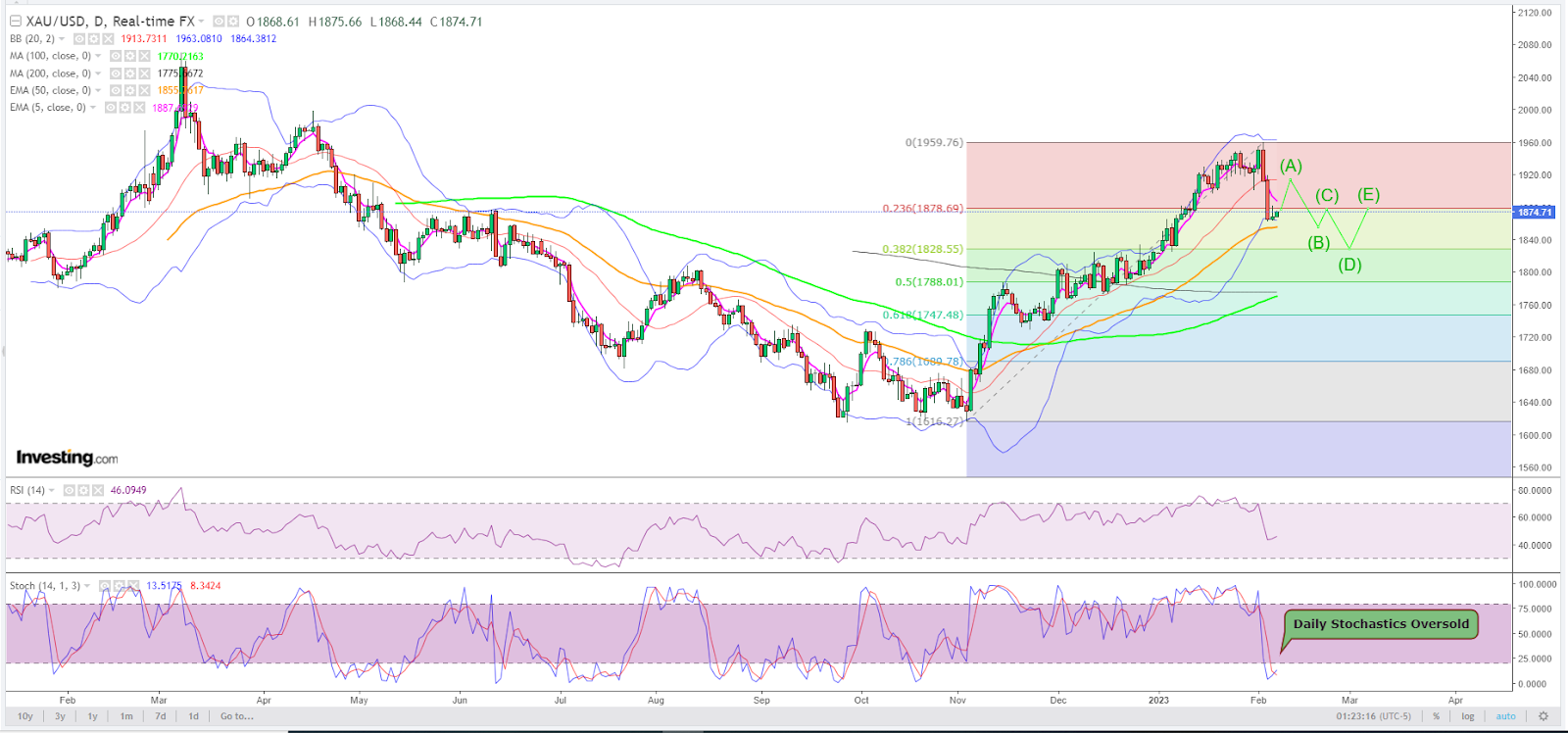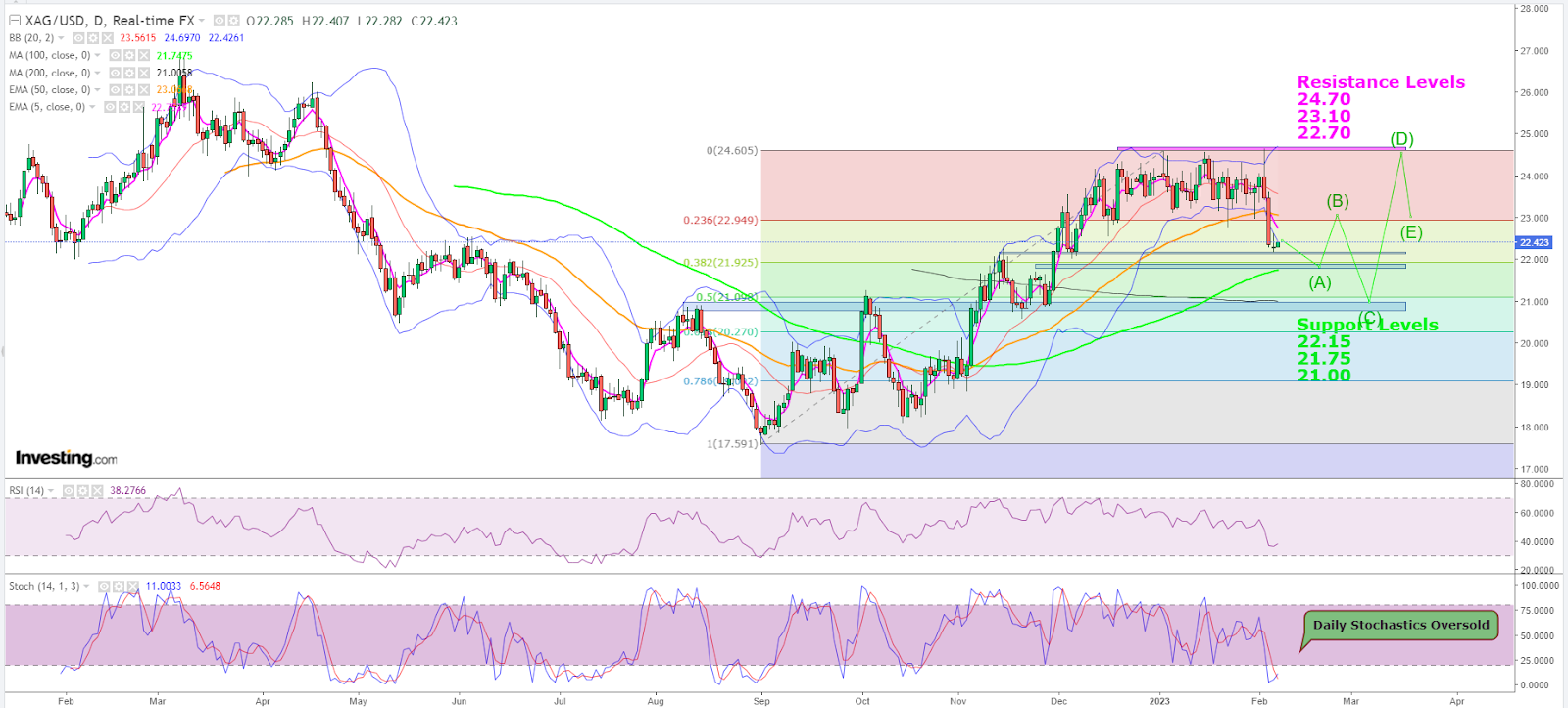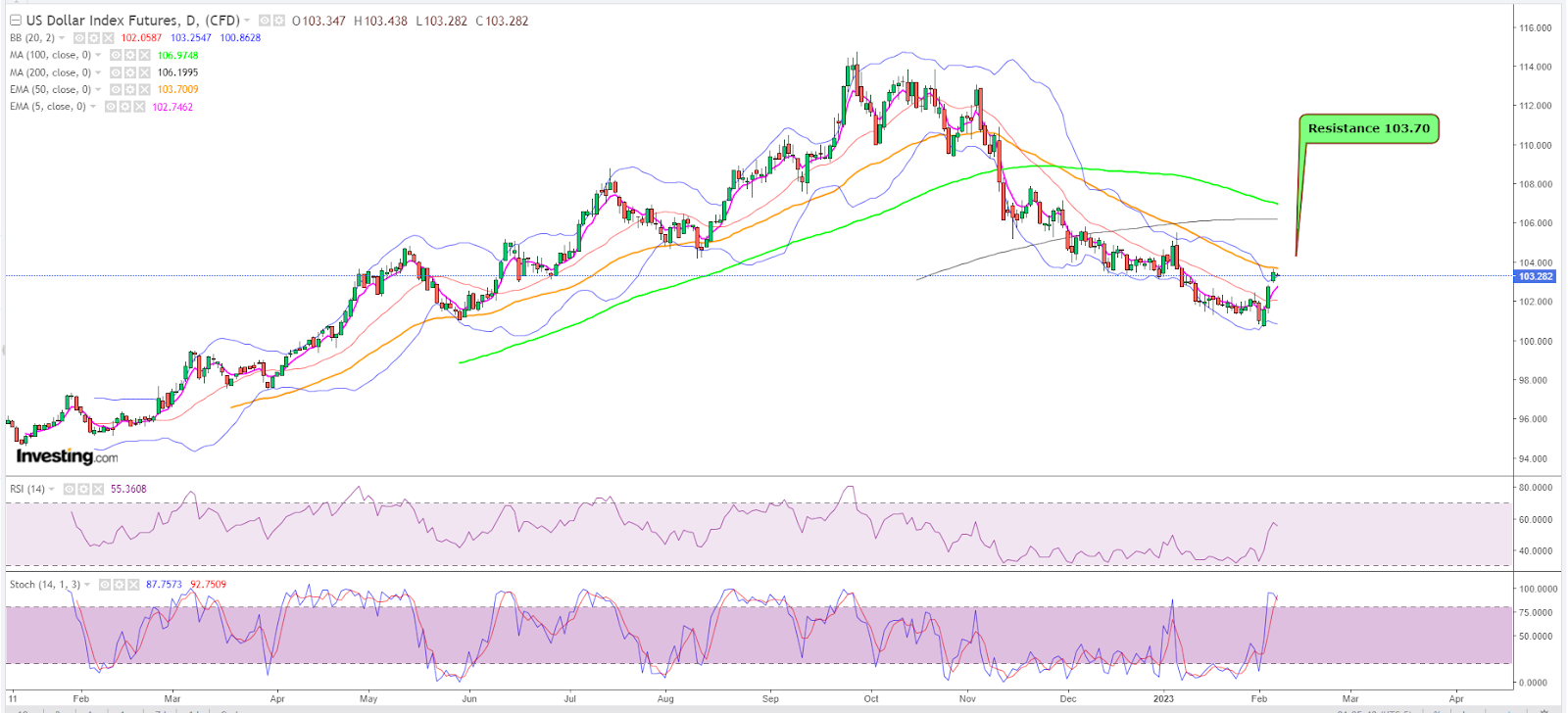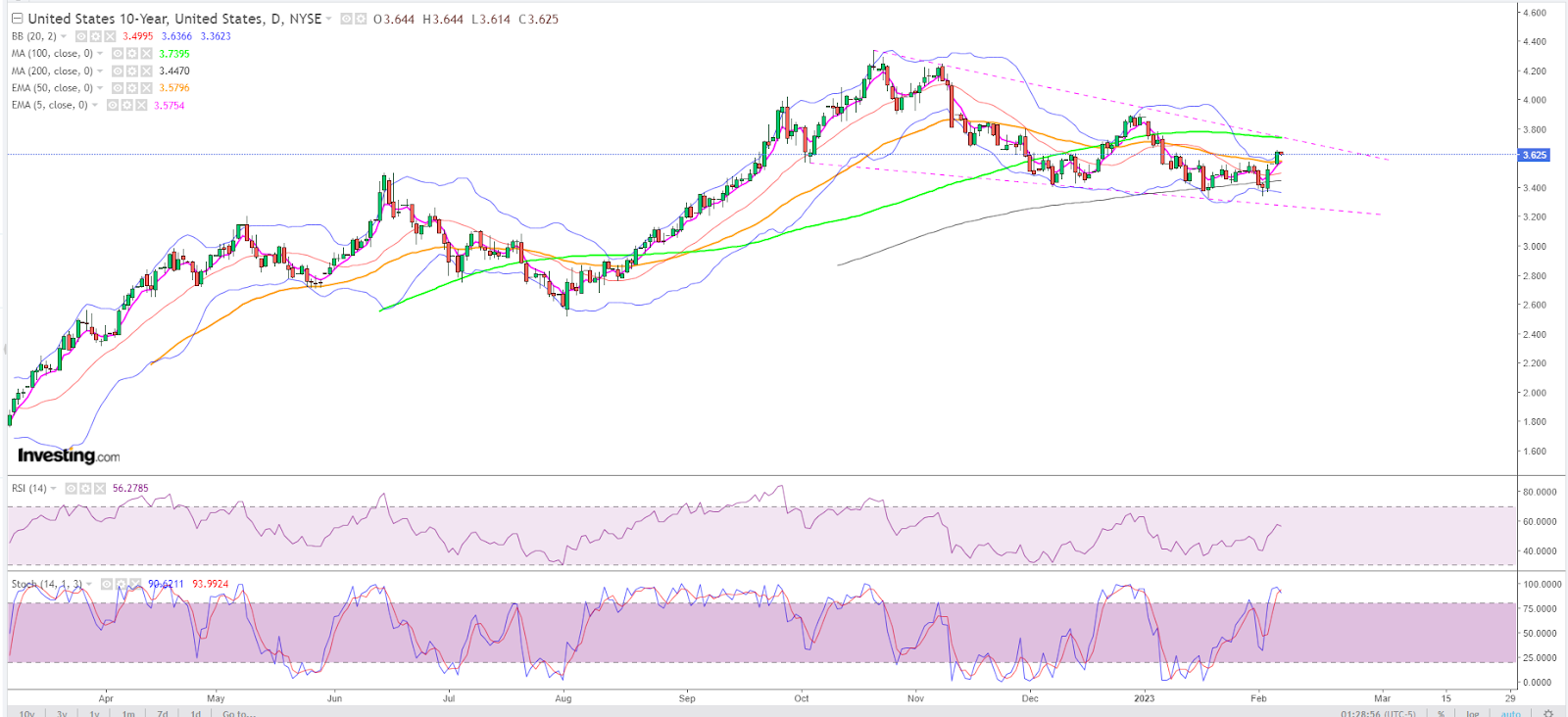Gold/Silver Anxiety: How Will Powell React to Latest U.S. Jobs Report?
NEW YORK (Feb 7) The red dye was cast on the yellow metal almost immediately after the U.S. jobs numbers for January were out.
The report of 517,000 jobs — in the place of an expected 185,000, and versus December’s 260,000 — had the subtlety of a pneumatic drill being driven into the collective conscience of gold bulls who, until then, had dreamt of $ 2,000 pricing from a timid employment picture and a Federal Reserve staying the course with smaller rate hikes.
The so-called non-farm payrolls instead wiped about $100 off gold in just 24 hours, taking futures on New York’s COMEX to a near one-month low of around $1,860 an ounce from a nine-month peak of almost $1,960 a day before the data, issued on Dec. 3. The good thing, of course, was that the Fed’s latest rate hike was already done by Feb. 1.
Gold finished the first day of this week positively, but its greater challenge will come when Fed Chair Jerome Powell shares his thoughts about the January jobs report at a discussion later today on the economy.
The central bank’s February rate hike pre-empted the non-farm payrolls report by a good 48 hours. All signs are that the Fed chair and his colleagues had no clue that a monstrous employment number was coming, especially after a moderation of 40,000 jobs in December.
The Fed’s next decision on rates will only be on Mar. 16, well after the release of the February non-farm payrolls report on Mar. 3. Should there be another round of heady jobs growth this month, then the central bank’s policy-making FOMC, or Federal Open Market Committee, will almost certainly be rethinking the merits of continuing with February’s 25-basis point hike. A return to a more aggressive 50-basis point increase might most likely be in order,
But that deliberation is still more than a month away. More immediate will be what Powell says at his 12:00 ET (17:00 GMT) appearance at the Economic Club of Washington DC and the impact that will have on markets across the board, including gold and silver.
Bets are that the Fed chair will again express surprise over the unexpected resilience of the labor market despite the central bank’s hopes that job and wage growth would have cooled along with demand after a year of rate hikes.
It appears that a return to 2%-per-year inflation — the December reading for the Consumer Price Index was 6.5% per annum — could be harder than thought, Powell could say.
In conclusion, he is expected to say that the Fed might have to raise rates to a “higher restrictive level” than previously thought and keep them there to sufficiently cool price growth.
But all these might already be baked into the cake, especially after Atlanta Fed President Raphael Bostic’s observation on Monday that the January jobs report had raised the possibility of the Fed bringing rates to a higher peak than previously forecast. Bostic, speaking at an interview with Bloomberg, reiterated that his base case remains for a peak rate of 5.1%, versus the present rate of 4.75%.
Powell told reporters last week that he thought “a couple more” increases might bring rates to a restrictive level. If he had the same 25-basis point increase as the last time, that would suggest a peak rate of 5.25%. But his remarks came before the January jobs report. That, and what the Labor Department reports for February, might greatly alter the discussion on rates going forth.
Said Bernard Baumohl, chief global economist at The Economic Outlook Group:
“With the release of this extraordinary employment report, the danger is the Federal Reserve may feel pressure to become far more aggressive and ratchet up interest rates until it chokes off the demand for workers.”
But such a stance also highlights “the flawed theory and models the Fed works with,” Baumohl said. “Instead,” he added:
“We should celebrate the strength of the current labor market and accept the fact that an economy can actually enjoy both robust job growth and lower inflation. The belief that having both violates a fundamental law in economic science is no longer tenable.”
To Wall Street and precious metals, of course, the good news is often bad news. This is because such news tends to bump up the dollar and Treasury bond yields as well, in expectation of higher rates.
Despite a worrying slump in manufacturing, there’s been other good U.S. data lately, aside from just jobs numbers. A report on the services sector from the Institute of Supply Management found the monthly index jumping six points to 55.2 – beating estimates of 50.5 and well into what is considered expansion levels. New orders rose sharply to 60.4, with business activity matching that strong number.
Tim Smart said in a U.S. News commentary on Monday:
“A new narrative is now afoot on Wall Street, where fears of an economy too hot to handle are now being met with concerns the Fed may have to tighten more than expected and bring on a hard landing for the economy.”
Steve Wyett, chief investment officer for Bok Financial, concurs, saying the January jobs report might have put to rest the idea that the Fed will cut rates at some point this year to help an economy headed into recession. “They are not going to ease this year,” Wyatt added with conviction.
So, back to the debate on what’s likely to happen to gold and silver after Powell’s speech.
To figure these two out, we also need to see what could happen to the Dollar Index and 10-year US Treasury yields.
Investing.com’s regular collaborator on commodity technicals, Sunil Kumar Dixit, breaks it down for us.
Spot Gold

Spot Gold Daily Chart
As long as the 23.6% Fibonacci level of $1878.70 on spot gold is not breached with a 4 Hour and Day closing above the level, the risk of correction extends further towards the 50-Day EMA, or Exponential Moving Average, of $1,855.70.
The next 38.2% Fibonacci level of $1,828.55 also remains a high probability.
The 100-week SMA, or Simple Moving Average, of $1,807 and the 50-week EMA of $1,801 will continue to act as major support in the event of a correction digging deeper beyond $1,828.
It is important to note that gold’s primary trend continues to remain bullish and buyers are likely to resurface on the test of value zone.
If the hold at $1878.70 is strongly established, the next challenge will come at $1,890-$1,900-$1,910.
Spot Silver

Spot Silver Daily Chart
As $24.65 posed a challenge for the bulls, spot silver suffered a correction that broke through the support areas of $23.10 and $22.70 that have turned into a resistance zone now.
Despite oversold conditions on the Daily Stochastics reading of 12/7, a further drop towards $22.15 and the 100-Day SMA of $21.75 is a high probability.
If selling intensifies below 21.75, there can be an expectation of further decline towards major support at the 200-Day SMA of $21.00.
As the primary trend of silver continues to remain bullish, buyers are likely to resurface on the test of value zone and rally can resume from support areas aiming a retest of the initial swing high to $24.65.
Dollar Index

Dollar Index Daily Chart
The Dollar Index faces resistance at the 50-Day EMA of 103.70, which if breached, can make a small extension rally towards the 50-week EMA of 104.00. At this point, selling can be witnessed, pushing the index towards the support areas of 102.80 and 101.96.
10-Year Treasury Yields

10-year Treasury Yield Daily Chart
The yield on the 10-year Treasury note can achieve further gains at the 100-Day SMA of 3.74 and 3.88.
Meanwhile, resistance impact may dampen momentum, causing a drop to the 200-Day SMA of 3.44.
Investing.com









